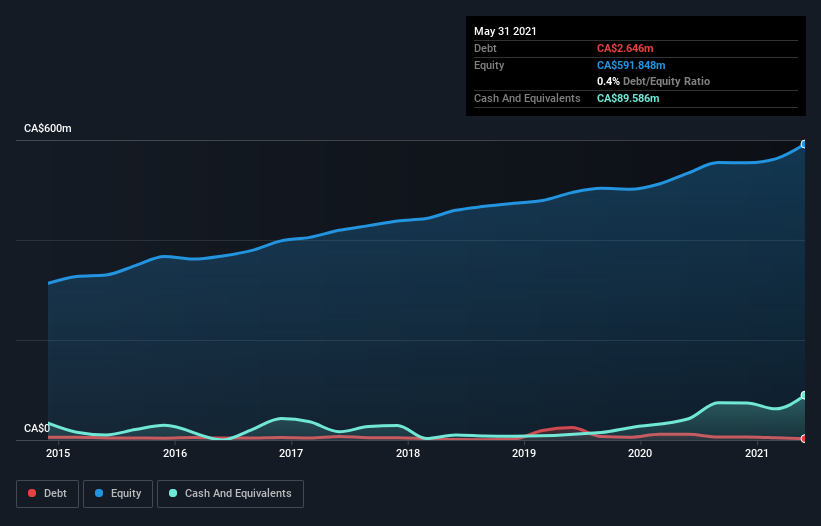Is Richelieu Hardware (TSE:RCH) A Risky Investment?
Legendary fund manager Li Lu (who Charlie Munger backed) once said, 'The biggest investment risk is not the volatility of prices, but whether you will suffer a permanent loss of capital.' So it might be obvious that you need to consider debt, when you think about how risky any given stock is, because too much debt can sink a company. As with many other companies Richelieu Hardware Ltd. (TSE:RCH) makes use of debt. But the real question is whether this debt is making the company risky.
Why Does Debt Bring Risk?
Debt is a tool to help businesses grow, but if a business is incapable of paying off its lenders, then it exists at their mercy. Ultimately, if the company can't fulfill its legal obligations to repay debt, shareholders could walk away with nothing. However, a more frequent (but still costly) occurrence is where a company must issue shares at bargain-basement prices, permanently diluting shareholders, just to shore up its balance sheet. Of course, plenty of companies use debt to fund growth, without any negative consequences. The first step when considering a company's debt levels is to consider its cash and debt together.
See our latest analysis for Richelieu Hardware
How Much Debt Does Richelieu Hardware Carry?
As you can see below, Richelieu Hardware had CA$2.65m of debt at May 2021, down from CA$11.4m a year prior. But it also has CA$89.6m in cash to offset that, meaning it has CA$86.9m net cash.
How Healthy Is Richelieu Hardware's Balance Sheet?
Zooming in on the latest balance sheet data, we can see that Richelieu Hardware had liabilities of CA$151.9m due within 12 months and liabilities of CA$67.7m due beyond that. Offsetting these obligations, it had cash of CA$89.6m as well as receivables valued at CA$175.6m due within 12 months. So it can boast CA$45.5m more liquid assets than total liabilities.
Having regard to Richelieu Hardware's size, it seems that its liquid assets are well balanced with its total liabilities. So it's very unlikely that the CA$2.54b company is short on cash, but still worth keeping an eye on the balance sheet. Succinctly put, Richelieu Hardware boasts net cash, so it's fair to say it does not have a heavy debt load!
In addition to that, we're happy to report that Richelieu Hardware has boosted its EBIT by 60%, thus reducing the spectre of future debt repayments. There's no doubt that we learn most about debt from the balance sheet. But it is future earnings, more than anything, that will determine Richelieu Hardware's ability to maintain a healthy balance sheet going forward. So if you're focused on the future you can check out this free report showing analyst profit forecasts.
Finally, a company can only pay off debt with cold hard cash, not accounting profits. While Richelieu Hardware has net cash on its balance sheet, it's still worth taking a look at its ability to convert earnings before interest and tax (EBIT) to free cash flow, to help us understand how quickly it is building (or eroding) that cash balance. During the last three years, Richelieu Hardware generated free cash flow amounting to a very robust 89% of its EBIT, more than we'd expect. That positions it well to pay down debt if desirable to do so.
Summing up
While we empathize with investors who find debt concerning, you should keep in mind that Richelieu Hardware has net cash of CA$86.9m, as well as more liquid assets than liabilities. And it impressed us with free cash flow of CA$129m, being 89% of its EBIT. So we don't think Richelieu Hardware's use of debt is risky. Another factor that would give us confidence in Richelieu Hardware would be if insiders have been buying shares: if you're conscious of that signal too, you can find out instantly by clicking this link.
Of course, if you're the type of investor who prefers buying stocks without the burden of debt, then don't hesitate to discover our exclusive list of net cash growth stocks, today.
This article by Simply Wall St is general in nature. We provide commentary based on historical data and analyst forecasts only using an unbiased methodology and our articles are not intended to be financial advice. It does not constitute a recommendation to buy or sell any stock, and does not take account of your objectives, or your financial situation. We aim to bring you long-term focused analysis driven by fundamental data. Note that our analysis may not factor in the latest price-sensitive company announcements or qualitative material. Simply Wall St has no position in any stocks mentioned.
Have feedback on this article? Concerned about the content? Get in touch with us directly. Alternatively, email editorial-team (at) simplywallst.com.

 Yahoo Finance
Yahoo Finance 
